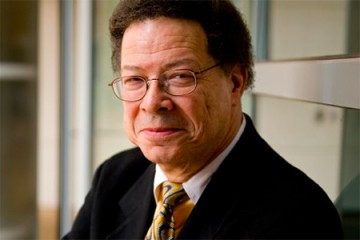Colleagues, family members, and others from across the Johns Hopkins community gathered Thursday afternoon at Turner Auditorium in East Baltimore to remember Levi Watkins Jr., a pioneer in both cardiac surgery and civil rights who died in April at age 70.
Watkins is best known for implanting the first automatic heart defibrillator in a patient, recruiting minority students to the Johns Hopkins School of Medicine, and founding the annual Johns Hopkins Martin Luther King Jr. Commemoration event. He joined Johns Hopkins Medicine in 1970 as a surgical intern and, after a research stint at Harvard Medical School, became The Johns Hopkins Hospital's first black chief resident in cardiac surgery.
On Thursday, those who worked with—and learned from—Watkins spoke about his impact on medicine and on civil and human rights. Speakers included Paul B. Rothman, dean of the medical faculty and CEO for Johns Hopkins Medicine; Ronald R. Peterson, president of The Johns Hopkins Hospital and Health System; and Ronald J. Daniels, president of Johns Hopkins University. The event also included a video tribute to Watkins.
"Honestly, there are very few people with the blend of talent and tenacity that is required to put their own enduring stamp on this place," Rothman said during the event. "Levi was one of those exceptional individuals. He arrived here 45 years ago, and it's hard to imagine what Johns Hopkins Medicine would look like if he hadn't.
"Levi's presence at Johns Hopkins is missed, but in this way, his influence will permeate our classrooms, clinics and boardrooms for years to come," he added. "On behalf of Johns Hopkins Medicine, we honor Levi Watkins for a singular life marked by service to the highest ideals."
Posted in Health, University News








